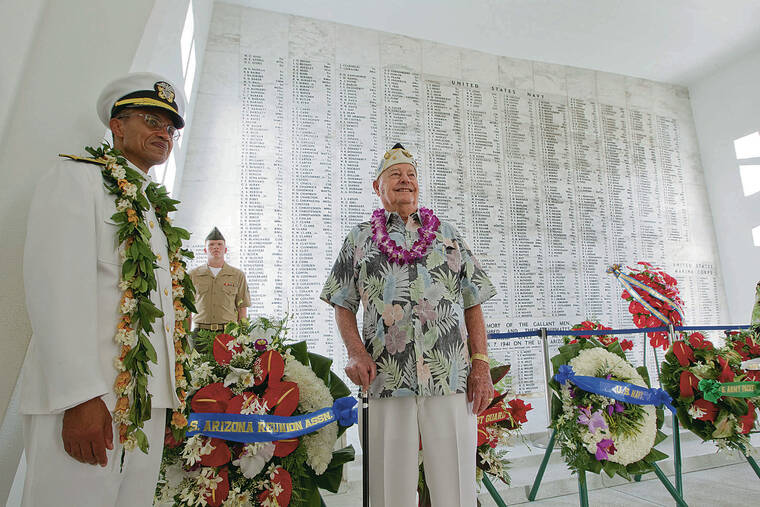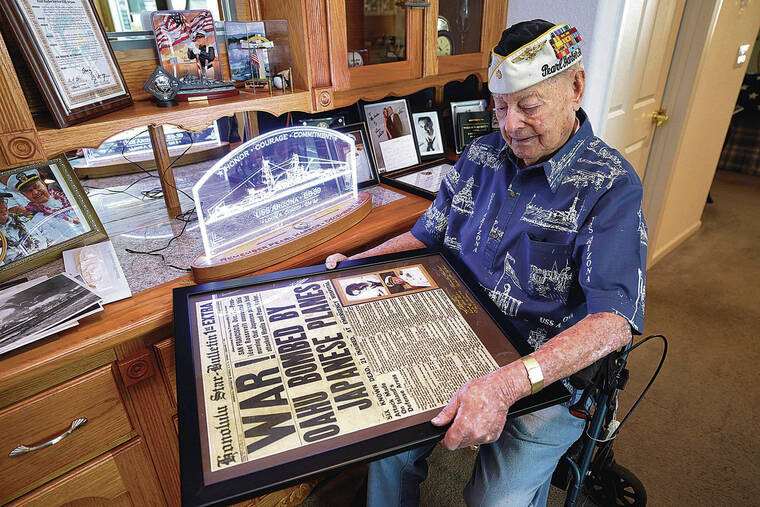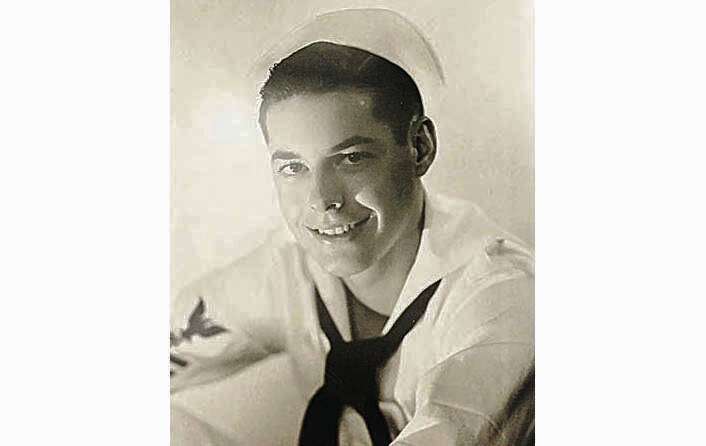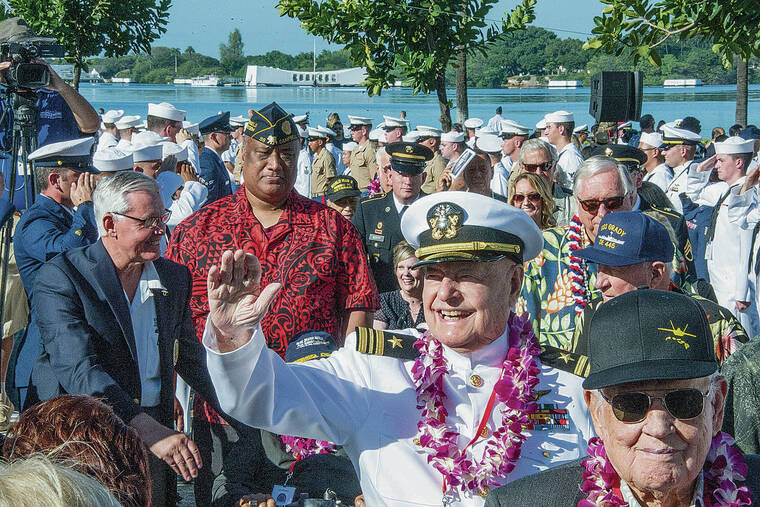Lou Conter, last survivor of the USS Arizona, dies at 102


ASSOCIATED PRESS
“Lou Conter epitomized what it meant to be a member of the Greatest Generation, Americans whose collective courage, accomplishments and sacrifices saved our country from tyranny.”
Aileen Utterdyke
President and CEO of Pacific Historic Parks

ASSOCIATED PRESS / 2022
USS Arizona survivor Lou Conter holds a framed replica of the Dec. 7, 1941, Honolulu Star-Bulletin front page at his home in Grass Valley, Calif.

ASSOCIATED PRESS / 2022
A photo of Conter as a young sailor.

CRAIG T. KOJIMA / 2017
Above, USS Arizona survivor Lou Conter salutes as he leaves a memorial ceremony at Pearl Harbor.





Lou Conter, the last survivor of the USS Arizona, died Monday morning at his home in Grass Valley, Calif., at the age of 102.
“Both my brothers and I were here all night with him and this morning when he passed peacefully,” his daughter Louann Daley said Monday.
Daley said that the family had been preparing — Conter had been experiencing heart problems and other ailments that sent him to the hospital on February 16, spending 10 days there before returning home and going into hospice care.
“We’ve been able to spend a month and a half with him at home, on hospice,” Daley told the Honolulu Star-Advertiser. “We’re just blessed that it was peaceful, he wasn’t in any pain. We were expecting it. But of course, when reality set in this morning, it was very, very hard.”
“Lou Conter epitomized what it meant to be a member of the Greatest Generation, Americans whose collective courage, accomplishments and sacrifices saved our country from tyranny,” said Aileen Utterdyke, president and CEO of Pacific Historic Parks, an organization dedicated to preserving historical military sites in the Pacific. “He had an exemplary career in the Navy and was steadfast in imploring the schools, parents and everyday Americans to always remember Pearl Harbor.”
Of the 2,390 Americans killed in the Pearl Harbor attack, 1,177 were members of Arizona’s crew. Conter was among the just 335 Arizona crew members who survived.
Don't miss out on what's happening!
Stay in touch with breaking news, as it happens, conveniently in your email inbox. It's FREE!
“The passing of Lou is the end of an era and so hard for the many of us who have gotten to know him over the years,” said Tom Leatherman, the National Park Service superintendent for the Pearl Harbor National Memorial. “Now more than ever we must find a way to keep the legacy of Pearl Harbor, that Lou championed for so many years, alive. We owe it to him and all those who served and lost their lives to make sure they did not die in vain.”
Conter was born in Ojibwa, Wis., on Sept. 13, 1921. He was a middle child with one older and one younger sister. His father and uncle worked road construction gigs around the country. The family moved frequently, from Wisconsin to New Mexico in 1922, to Denver in 1924 and to Stockton, Kansas, in 1927 before returning to Colorado in 1930 to work a farm outside Denver.
Conter enlisted in the Navy on Nov. 15, 1939, in Denver and completed basic training in San Diego. He was assigned to the Battleship USS Arizona on Jan. 24, 1940, as a quartermaster. He was 20 years old on Dec. 7, 1941, when the Japanese Imperial Navy launched its surprise attack on Pearl Harbor.
Conter was originally supposed to have returned back to the mainland on the ocean liner SS Lurline — one of Matson’s last luxury liners — in November 1941 to attend Navy flight school. But the Arizona was scheduled to head to Long Beach, Calif., on Dec. 19 and the ship’s leadership decided he should stay with the Arizona through the voyage and report from there.
He was on watch duty on the ship’s stern when a squadron of Japanese torpedo planes and bombers attacked at 7:55 a.m. Within minutes the Arizona was struck by a armor-piercing bomb that started a fire in its ammunition storage magazine. It soon exploded, blowing off the battleship’s bow and lifting the Arizona out of the water. The explosion knocked Conter off his feet and killed several other sailors nearby.
As the ship burned it started to sink, while Japanese planes continued firing on it and its crew. Conter leapt into action, assisting badly injured sailors and working to keep frightened crew members from jumping in the burning oil that soon covered much of the water’s surface.
When he heard the order to abandon ship, Conter joined his comrades in the lifeboats. More survivors struggled to escape the burning husk of the ship and Conter helped save as many as he could, pulling men out out of the water into his lifeboat before they rowed to shore. The Arizona ultimately sank in just 9 minutes.
Fires continued for days across Pearl Harbor as service members worked to put them out and survey the wreckage. Conter was among those who spent several weeks helping to put out flames and recovering bodies.
Conter recalled that he eventually did sail on the Lurline — which during World War II became a troop carrier — to San Francisco and went to flight school. He got his wings in 1942 and flew PBY Catalina seaplanes with the Patrol Squadron 11 “Black Cats,” flying stealthy night missions.
He survived two shoot-downs, including one during the New Guinea Campaign in which the crew found themselves surrounded by sharks until they were fished out of the Pacific. He would later credit his experiences during the Pearl Harbor attack with giving him the experience to lead crewmates through the ordeal. After World War II, he became an intelligence officer, but saw action again flying combat missions during the Korean War from the aircraft carrier USS Bon Homme Richard.
He returned home and held a variety of postings with elite special operations units. He became a legendary figure in the military intelligence community who became known for his role in helping create the Navy’s first survival, evasion, resistance and escape training program — better known as SERE. The program trains military personnel to avoid capture and, if they can’t, how to withstand torture and escape.
He was at various times a military adviser to Presidents Dwight D. Eisenhower, John F. Kennedy and Lyndon B. Johnson. Conter retired from the Navy in 1967 at the rank of lieutenant commander. After leaving the military, he went into the real estate business in California.
“When I was little growing up, me and my brothers knew he was in the Navy because he’d put his uniform on and go to the base, but we never really knew the extent of his military service and background and really what he did,” recalled Daley. “Especially because he was in intelligence, he didn’t really talk about it at home. When he came home, he was just dad. He was just a father, a family man.”
Daley said Conter never really spoke about the Pearl Harbor attack until he decided to fly to Hawaii for the 50th anniversary. From then on, he began going every year until 2020, when the COVID- 19 pandemic forced the commemoration to go digital.
“Even growing up we did not really know he was on the USS Arizona or really what it meant to be on the USS Arizona and survive that,” said Daley. “It wasn’t until many years later that he started talking about it.”
During his last trip in 2019, he was present at the internment of the remains of fellow Arizona shipmate Lauren Bruner, who died that September at age 98. Arizona survivors reserve the right to have their remains interred in the wreckage of the Arizona with their fallen comrades if they choose.
In 2014, Conter began a tradition during anniversaries of joining Bruner for a drink on Hotel Street at Smith’s Union Bar — the Arizona crew’s local watering hole. In 2019, Conter told the Star-Advertiser at the time “we have to bury Lauren Bruner on Saturday, so (I) had to come back. I’ll come out every year I can until I’m gone.” He made one last trip to the bar in his friend’s honor that year.
Though he hasn’t made it to Hawaii physically since then, he has still participated in commemorations. During the 81st anniversary commemoration in 2022, he submitted prerecorded remarks that were played over a loudspeaker at the Pearl Harbor National Memorial, telling attendees “anytime I’m out there, I take a moment to review the names of my shipmates, and thank God for their ultimate sacrifice. We need to make future generations understand what Pearl Harbor really was about and what was at stake.”
“With the humility we so admired in all of our Arizona and Pearl Harbor survivors, Lt. Cdr. Conter always deferred to his comrades lost on December 7th as the real heroes, though he served with heroism both then and throughout the war and continued to give back to his country throughout his long life,” said U.S. Rep. Ed Case. “And like them all, he always considered it his own special kuleana to bear personal witness to that day and bore that obligation with selfless grace. With his passing and the loss of our last living link to that singular event in our history, we can best honor his legacy and that of his comrades by making every effort to preserve the memories and lessons of Pearl Harbor.”
In a statement Gov. Josh Green said “Lou Conter is one of the greatest examples of ‘the Greatest Generation’ … we are forever grateful to Lou and all those who served aboard the USS Arizona and on all of the other ships in Pearl Harbor on that fateful day. Hawai‘i and America salute their service and their memory.”
Adm. Samuel Paparo, who is currently commander of the U.S. Navy’s Pacific Fleet and will take over command of all U.S. military forces in the Pacific later this year when Adm. John Aquilino retires, said Conter’s passing is cause for reflection for those currently serving.
“Lou was a true hero and American patriot,” said Paparo. “He represented an extraordinary generation of sailors, whose actions in World War II, Korea, and beyond left an indelible impression on the Navy and the nation, and whose impact and sacrifice will not be forgotten.”
The second-to-last survivor of the USS Arizona was Ken Potts, who died last year in Provo, Utah, at the age of 102. The last known Pearl Harbor attack survivor residing in Hawaii was Sterling Cale, who died at his home in Aiea on Jan. 10 at age 102 and was buried in Kaneohe on March 7. With Conter’s passing there are now only 19 known survivors of the attack.
Conter had hoped to attend the 82nd Pearl Harbor attack anniversary in December, but was unable to make the long journey across the Pacific. However, his grandnephew Capt. Ray Hower, a U.S. Marine aviator, was present to deliver the keynote speech for the ceremony while Conter watched it streamed live from his home in California.
“Our nation came together as never before or since, and the Greatest Generation was born,” Hower told attendees. “Our country was united in purpose and with the help of our allies was ultimately victorious. But they weren’t done; after years of war our nations and the world needed healing. Those that fought for freedom returned home and threw themselves into that task with the same determination.”
Daley said that through Conter’s involvement with veteran’s groups and travels to Hawaii, he found himself part of a tightknit community and said “he was very lucky that he had so many friends.”



